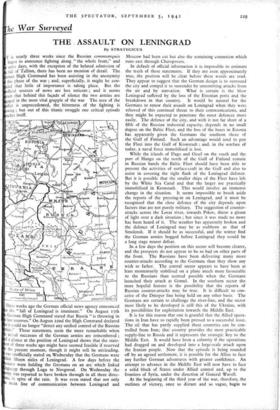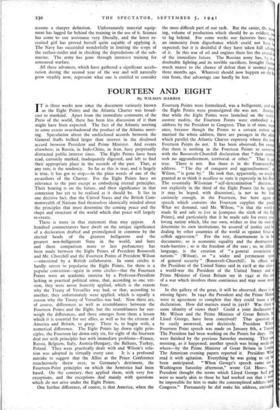h e War Surveyed
THE ASSAULT ON LENINGRAD
By STRATEGICUS
T is nearly three weeks since the Russian communiques began to announce fighting along ." the whole front," and some days, with the exception of the belated admission of fall of Tallinn, there has been no mention of detail. The rman High Command has been assisting in the anonymity this phase of the war ; and, superficially, it might be con- ded that little of importance is taking place. But the official sources of news are less reticent ; and it seems tin that behind this facade of silence the two armies are aged in the most vital grapple of the war The area of the oilier is unprecedented, the bitterness of the fighting is wing ; but out of this titanic struggle one critical episode taches itself.
Three weeks ago the German official news agency announced t the " fall of Leningrad is imminent." On August i7th e German High Command stated that Russia " is throwing in r last reserves." On August 22nd the High Command declared t it could no longer "detect any unified control of the Russian 'es." These statements seem the more remarkable when e actual successes of the German armies are remembered ; d a glance at the position of Leningrad shows that the state- d of three weeks ago might have seemed feasible if reserved the present moment, though it might still be misleading. was unofficially stated on Wednesday that the Germans were thin fifteen miles of Leningrad. A few days before the starts were holding the Germans on an arc which linked gisepp through Luga to Novgorod. On Wednesday the my was reported to have broken through in all three dire;.-
i
ns, in spite of the rain. It was even stated that not only main line of communication between Leningrad and Moscow had been cut but also the remaining connexion which runs east through Cheropovets.
In default of official information it is impossible to estimate the truth of these statements. If they are even approximately true, the position will be clear before these words are read. They appear to suggest that the German design is to surround the city and compel it to surrender by unremitting attacks from the air and by starvation. What is certain is the blow Leningrad suffered by the loss of the Estonian ports and the breakdown in that country. It would be natural for the Germans to renew their assault on Leningrad when they were relieved of this continual threat to their communications, and they might be expected to penetrate the outer defences more easily. The defence of the city, and with it not far short of a fifth of the Russian industrial capacity, depends in no small degree on the Baltic Fleet, and the loss of the bases in Estonia has apparently given the Germans the southern shore of the Gulf of Finland. Such an advantage would tend to pen the Fleet into the Gulf of Kronstadt ; and, in the warfare of today, a naval force immobilised is lost.
While the islands of Dago and Oesel on the south and the port of Hango on the north of the Gulf of Finland remain in Russian hands the Baltic Fleet should have been able to prevent the activities of surface-craft in the Gulf and also to assist in covering the right flank of the Leningrad defence. But it is possible that the smaller ships of the Fleet have left by the White Sea Canal and that the larger are practically immobilised in Kronstadt. This would involve an immense change in the situation. It seems impossible to brush aside the reports of the pressing-in on Leningrad, and it must be recognised that the close defence of the city depends upon factors that are not purely military. The suggestion of counter- attacks across the Lovat river, towards Pskov, threw a gleam of light over a dark situation ; but since it was made no more has been heard of it. The weather has apparently broken and the defence of Leningrad may be as stubborn as that of Smolensk. If it should be as successful, and the winter find the German armies bogged before Leningrad they would be a long stage nearer defeat.
In a few days the position on this sector will become clearer, and the prospects do not appear to be so bad on other parts of the front. The Russians have been delivering many more counter-attacks according to the Germans than they show any wish to father. The central sector appears to have been at least momentarily stabilised on a plane much more favourable to the Russians than seemed possible when the Germans launched their attack at Gomel. In the southern sector the most hopeful feature is the possibility that the reports of Russian counter-attacks may be true. It is difficult to con- ceive of the Dnieper line being held on any other basis. The Germans are certain to challenge the river-line, and the sector most likely to be developed is still this of the Ukraine, with its possibilities for exploitation towards the Middle East.
It is for this reason that one is grateful that the Allied opera- tions in Iran have so rapidly been pressed to a successful issue. The oil that has partly supplied three countries can be con- trolled from Iran; that country provides the most practicable supply-line to Russia and it represents the strategic key to the Middle East. It would have been a calamity if the operations had dragged on and developed into a large-scale attack upon the Iranian people. Now that the episode is being rounded off by an agreed settlement, it is possible for the Allies to face any further German adventures with greater confidence. An attempt to advance in the Middle East will now have to face a solid block of States under Allied control and, up to the frontiers of Syria, under the direction of General Wavell.
At the beginning of the third year of the war, therefore, the outlines of victory, once so distant and so vague, begin to assume a sharper definition. Unfortunately material equip- ment has lagged far behind the training in the use of it. Science has come to our assistance very liberally, and the latest re- cruited girl has proved herself quite capable of applying it. The Navy has succeeded wonderfully in limiting the scope of the surface-raider and in checking the depredations of the sub- marine. The army has gone through intensive training for armoured warfare.
All these advances, which have gathered a significant accele. ration during the second year of the war and will naturally grow steadily now, represent what one is entitled to consider The most difficult part of our task. But the easier, the in ing, volume of production which should be as evident, to lag behind. For some weeks our factories have en) an immunity from diiturbance which could not have expected; but it is doubtful if they have taken full adv of it. In this war of oil and engines there lies the crucial of the immediate future. The Russian army has, by its doubtable fighting\and its terrible sacrifices, brought Ge much nearer to the chance of defeat than it seemed pos three months ago. Whatever should now happen on the sian front, that advantage can hardly be lost.



























 Previous page
Previous page